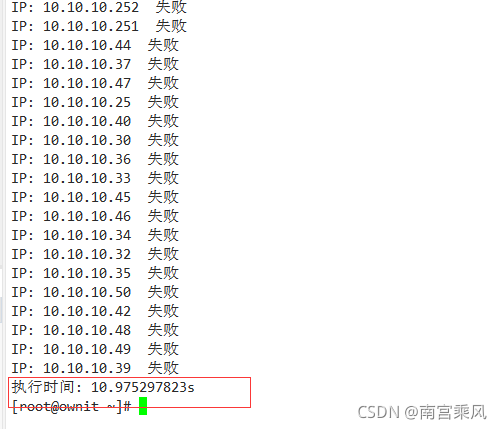语言的协程会并发,执行,可以大大提高效率。列如,我们通过来检测网络的主机的话。如果使用的话,会检查一个,在检查下一个,速度很慢。如果我们使用的话,可以使用多线程。我们这里使用的协程来操作,速度是刚刚的。。。。。。。
Go语言的协程会并发,执行,可以大大提高效率。
列如,我们通过 ping 来检测网络的主机的话。
如果使用shell的话,会检查一个IP,在检查下一个IP,速度很慢。
如果我们使用Python 的话,可以使用多线程。
我们这里使用Go的协程来操作,速度是刚刚的。
一个网段,10S中,相当于,一秒钟处理25个左右的IP,因为ping检查,有延时性

此脚本,只能在Linux上执行
1
2
3
4
5
6
7
8
9
10
11
12
13
14
15
16
17
18
19
20
21
22
23
24
25
26
27
28
29
30
31
32
33
34
35
36
37
38
39
40
41
42
43
44
45
|
package main
import (
"fmt"
"os/exec"
"strconv"
"strings"
"sync"
"time"
)
var wg sync.WaitGroup
func main() {
start := time.Now()
ip := "10.10.10."
wg.Add(254)
for i := 1; i <= 254; i++ {
//fmt.Println(ip + strconv.Itoa(i))
true_ip := ip + strconv.Itoa(i)
go ping(true_ip)
}
wg.Wait()
cost := time.Since(start)
fmt.Println("执行时间:", cost)
}
func ping(ip string) {
var beaf = "false"
Command := fmt.Sprintf("ping -c 1 %s > /dev/null && echo true || echo false", ip)
output, err := exec.Command("/bin/sh", "-c", Command).Output()
if err != nil {
fmt.Println(err)
return
}
real_ip := strings.TrimSpace(string(output))
if real_ip == beaf {
fmt.Printf("IP: %s 失败\n", ip)
} else {
fmt.Printf("IP: %s 成功 ping通\n", ip)
}
wg.Done()
}
|
不得不说,GO语言的并发,是真的香啊,

